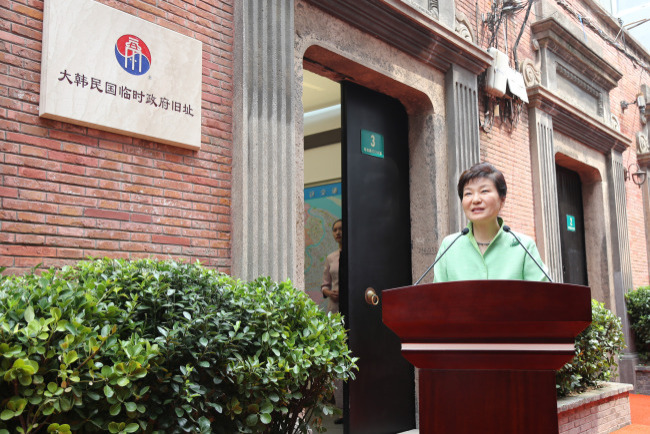South Korean President Park Geun-hye on Friday urged China to play a bigger role for unification of the two Koreas on the last day of her three-day trip that highlighted closer ties between the two countries.
At a meeting with Korean residents in Shanghai, the president stressed the roles of neighboring countries surrounding the Korean Peninsula to achieve peace in the region, particularly China, to push Pyongyang to take “a right path” to change.
On the breakthrough talks between the two Koreas last month, Park also vowed to continue her two-track policy toward Pyongyang to sternly deal with any provocation while leaving the door for dialogue open.
“The government will make actual preparations for unification by resuming the reunion of separated families soon and by expanding inter-Korean exchanges and cooperation,” she said.

Wrapping up her trip to China, Park also attended a reopening ceremony of the headquarters of the Korean Provisional Government, a building that had served as an overseas base against Japan‘s aggression.
Park called the historic building a symbol of friendship between South Korea and China, and a living proof that the two share the same values and history of struggle.
“This showed that South Korea and China share the historic meaning and value of sites of our independence struggle,” she said.
The provisional government was formed on April 13, 1919, as the Korean government-in-exile, a month after Korea launched an independence movement against Japan.
The Korean Peninsula was later divided into the capitalist South and the communist North after its independence from Japan in 1945.
Park expressed her gratitude to the Chinese government as it has helped preserve the building and other sites related to Korea’s independence movement against Japan.
“Our people remember well that the Chinese people provided support” to Korea’s independence movement, Park said in an interview with the People’s Daily, a state-run Chinese newspaper. “We are thankful to our old friends,” she said.
Before Shanghai, she held a summit in Beijing with her Chinese counterpart Xi Jinping in which the two reaffirmed the strengthening ties between the two. The South Korean leader also attended a rare military parade seen as China’s show of military strength.
In the summit with Park, Xi stressed that Koreans and Chinese fought against Japan’s aggressions when expressing his gratitude for her visit to China for the celebration. They also agreed to hold a trilateral meeting with Japan in late autumn for peace in the region.
South Korea, Japan and China are trading partners but tensions still persist over territorial and other history-related issues. Japan ruled the Korean Peninsula as a colony and controlled much of China in the early part of the 20th century.
Park said that only correct recognition of history can heal sufferings of the past.
“The countries in the region need to make joint efforts to move toward a new future based on a correct recognition of history,” Park told the People’s Daily. “On that premise, sufferings of past history can be healed and overcome.”
Before returning home, Park also called for an early ratification of a free trade deal between two countries at a business forum. On her trip, Park was accompanied by the largest number of South Korean business representatives this time to expand business ties with China, Cheong Wa Dae said. China is the nation’s largest trading partner.
By Cho Chung-un and news reports (christory@heraldcorp.com)


















![[Today’s K-pop] Treasure to publish magazine for debut anniversary](http://res.heraldm.com/phpwas/restmb_idxmake.php?idx=642&simg=/content/image/2024/07/26/20240726050551_0.jpg&u=)